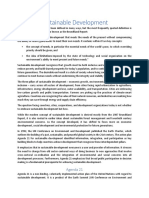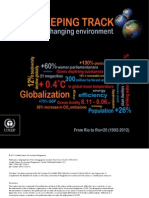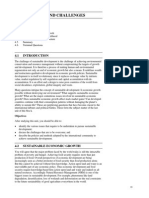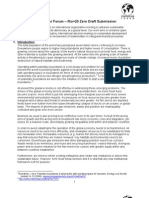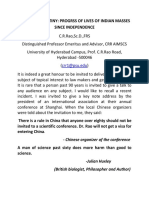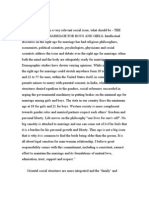Dominicans UN: The Journey To Rio+20
Dominicans UN: The Journey To Rio+20
Uploaded by
Aneesah McNameeCopyright:
Available Formats
Dominicans UN: The Journey To Rio+20
Dominicans UN: The Journey To Rio+20
Uploaded by
Aneesah McNameeOriginal Title
Copyright
Available Formats
Share this document
Did you find this document useful?
Is this content inappropriate?
Copyright:
Available Formats
Dominicans UN: The Journey To Rio+20
Dominicans UN: The Journey To Rio+20
Uploaded by
Aneesah McNameeCopyright:
Available Formats
2 1
Dominican Leadership Conference
Spring 2012
Dominicans at the UN
Cry out as if you have a million voices, for it is silence which kills the world. Catherine of Siena
The Journey to Rio+20
What is Rio+20 and Why Is It So Important?
The United Nations Conference on Sustainable Development (UNCSD, or RIO + 20 ), will be held from June 20 22 in Rio de Janeiro, Brazil. This event marks the 40th anniversary of the first Rio Conference more commonly known as the Earth Summit. The expectations for RIO + 20 are in many ways linked to the unfulfilled commitments and promises of the 1992 Earth Summit. The paradigm shift from unsustainable economic growth models to sustainable development was a commitment at the highest political level in 1992. However, the gaps in implementation of
Continued on
Why Should We Care?
The State of Our World Page 3
What Can You Do?
Page 2
Page 5
3 2 1
; Dominican Leadership Conference Spring 2012
Page 2
Rio 1992: The Earth Summit
The 1992 UN Conference on Environment and Development was the largest gathering of world leaders in history, with 117 heads of state and representatives of 178 countries in attendance. Its goal was to reconcile worldwide economic development with environmental protection. The Conference resulted in several significant agreements, including The Rio Declaration and its 21 Principles; Agenda 21 Programme of Action for sustainable development worldwide.; and Rio Conventions on biodiversity, climate and desertification and land degradation. Underlying the Earth Summit agreements was the realization that humanity had reached a turning point, and that we would be better able to manage and protect our ecosystems for a more prosperous future for all through a global partnership. Central to this partnership would be the UN Commission for Sustainable Development (UNCSD ), which met for the first time in June 1993. Its mandate was to monitor and report on the implementation of the Earth Summits agreements. The spirit of the Earth Summit was captured by the expression harmony with nature, which was brought to the fore in Principle 1 of the Rio Declaration : Human beings are at the center of concern for sustainable development. They are entitled to a healthy and productive life in harmony with nature. Another significant outcome of the Earth Summit was the validation of the participation of the Major Groups in the sustainable development process. This assures that the voice of civil society has a place at the table. The nine Major Groups are : farmers; women; youth; Indigenous Peoples; science & technology; business & industry; local authorities; NGOs; workers & trade unions.
Rio+20: Why Should We Care?
The 1992 Earth Summits promise to make environmental protectionan integral part of the development process has not been fulfilled; and its call to action document, Agenda 21, as well as the Rio Declarations Principles, are largely forgotten. These documents together provided a framework for action to be implemented globally, nationally and locally by governments, UN organizations and major groups in every area in which human activity has a direct impact on the environment. It is reasonable to ask : why this failure when the international community has the technological expertise; a clearer, scientifically-based understanding of Earth as a living system of interdependent, interrelated components of which humans are a part; and the financial resources to explore
and implement more sustainable models of development? Clearly, there is a reluctance to critique present economic and social systems, as well as a lack of political will for action based on such critique. It is equally clear that we can no longer proceed with a business as usual approach that assumes that there are no limits to Earths resources.
2 1
; Dominican Leadership Conference Spring 2012
Page 3
The State of Our World
The prevailing model of economic development, which has provided us with life as we experience it here in the United States, is no longer sustainable. It commodifies and exhausts Earths limited resources, and relies heavily on unequal trade which favors developed countries and transnational corporations at the expense of people, healthy ecosystems and the needs of present and future generations. Income inequalities between and within States are pervasive. The top 20% of the population enjoys more than 70% of the worlds total income; while the bottom 20% receive barely 2%. This growing gap in wealth between the rich and the poor is widely recognized as one of the root causes of conflict and violence worldwide. This distorted distribution of economic wealth is the consequence of a deregulated and destabilizing international financial system, and a multilateral trade system that favors transnational corporations and a minority of the population. Yet, when financial and economic crises hit, as in 2008-2009, it is those who already live in abject poverty who bear a disproportionate share of the burden. At the same time, the ecological crisis has significantly worsened. Despite the warnings voiced in Rio in 1992, resource depletion, pollution, loss of biodiversity, ecosystems, forests, as well as climate change, have escalated at an alarming rate. In 1992, the developed countries agreed to take the lead in shifting from an unsustainable mode of production and consumption, which relied almost exclusively on fossil fuel. However, this has not been the case; and to further exacerbate matters, emerging economies, like China and India, are patterning their economic development according to ours . Over the past century, the U.S. has been the worlds largest overall contributor to climate change, generating about 30% of total global energyrelated carbon dioxide emissions. We continue to produce far more emissions on an annual basis than any other nation, except China. And there is no significant sign of a shift in the offing. RIO + 20 must reclaim and advance an ethical and inclusive global vision that promotes ecological and social integrity, the global common good and the well-being of Earth and all her Peoples. In the words of the Earth Charter, RIO + 20 must move us to realize our responsibility to one another, to the greater community of life and to future generations.
; Dominican Leadership Conference Spring 2012
Page 4
Continued from Page 1
the agreed to conclusions are stunning. Many would say that we are at a genuine tipping point in terms of the viability of the Planet. What happens or does not happen at Rio next month will have far-reaching implication for us as a species, and for our one fragile home, Earth. That being said, it is important to note that there has been precious little, if any, significant coverage of this upcoming Conference in the US media, and it is important for us to ask why this is the case. But before focusing on Rio + 20 itself, here is a brief summary of the key outcomes of the 1992 Earth Summit, which will help provide a context for the upcoming conference.
What is Sustainable Development?
Sustainable development integrates the social, environmental and economic dimensions of development. For too long our development model has placed the social and environmental dimensions at the service of the economy. It is abundantly clear that this market-driven, profitcentered model has done nothing to eliminate the scourge of poverty, nor has it enhanced Earths flourishing. Sustainable development would be attentive to both the needs of people, and the limited nature of Earths resource base. RIO + 20 will attempt to address this issue by focusing on two themes: green economy in the context of sustainable development and poverty eradication; and, the institutional framework necessary to move sustainable development into the future.
What is the Green Economy?
While there is no universally accepted definition of this term, the United Nations Environment Programme 2011 defines a green economy as one that results in improved human well-being and social equity, while significantly reducing environmental risks and ecological scarcitiesit can be thought of as an economy which is low-carbon, resource efficient and socially inclusive. However, there is great concern on the part of civil society worldwide that this concept will be co-opted by the private sector business, industry, transnational corporations - into a market-driven venture that will put a price tag on nature by providing trading of carbon, forests, biodiversity and water. This in turn would lead to massive displacement and marginalization of communities most dependent on access to these resources. In other words, the green economy in the hands of business would be business as usual, with a tint of green. SOME GUIDING PRINCIPLES when considering a green economy include: Its holistic nature; that is, it encompasses the three dimensions of development: social, environmental and economic Its inter-generational equity: looking to both short and long-term implications of decisions made in the present, for future generations Its common but differentiated responsibilities: Developed countries must take the lead in changing unsustainable production/consumption patterns Developing countries must maintain their development goals, while adopting sustainable practices Developed countries commit to enable and support developing countries sustainable development through finance, technology transfer and reforms to global economic and financial structures. (cf. The Transition To A Green Economy : Benefits, Challenges and Risks from a Sustainable Development Perspective, Jose Antonio Ocampo, Columbia University )
; Dominican Leadership Conference Spring 2012
Page 5
An Institutional Framework
This where the rubber-hits-the-road. The world is in a far more precarious position than it was twenty years ago after the 1992 Earth Summit. The reason for this is quite simply that governments do not want to be held accountable for the agreements that they have entered into; or, they have chosen not to enter into certain agreements because they do not coincide with national self-interest. The hope is that the Conference in Rio will result in a mechanism that would have the authority to call governments to this accountability. The track record, however, is not encouraging. What is not needed is just another document. At the end of the day, there is really nothing left to say. What is needed is implementation, and the political will to let this happen, for the sake of the greater common good.
What Can You Do?
1) It is the hope that RIO + 20 will be attended by heads of state and government , as was the 1992 Conference. However, as of this writing it is unclear as to whether or not President Obama will attend. As US citizens, we have the grassroots power to urge our government to take leadership in the sustainable development process. Consider taking the time to send a letter, phone call or e-mail to President Obama, Mr. John Matuszak, the Head of the US Delegation to RIO + 20, Secretary of State Clinton, and UN Ambassador Susan Rice, as well as to your Congresspersons/Senators, urging them to: Give high priority to RIO + 20 and the critical need to re-establish balance with Earth and her ecosystems for the sake of not only ourselves, but for future generations; Affirm the need for a shared vision and a common ethical framework to inspire and guide decisions regarding sustainable development; Reaffirm the 1992 Rio Principles, giving particular emphasis to the Access to Information Principle (#10); the Polluter Pays Principle (#13); and the Precautionary Principle (#15). To read about the principles, go to: http://www.unep.org/Documents.Multilingual/Default.asp?documentid=78&articleid=1163 Adopt a Corporate Responsibility Sustainability Convention to ensure oversight of transnational corporations who might otherwise manipulate the concept of the green economy for the sake of profit. 2) Re-familiarize yourselves with the EARTH CHARTER - http://www.earthcharterinaction.org 3) Become part of the NATIONAL CLIMATE ETHICS CAMPAIGN http://www.climateethicscampaign.org
; Dominican Leadership Conference Spring 2012
Page 6
Addresses for Sustainable Development Advocacy
President Barack Obama http://www.whitehouse.gov/contact/submit-questions-and-comments The White House 1600 Pennsylvania Avenue NW Washington, DC 20500 Mr. John Matuszak MatuszakJM@State.gov Division Chief for Sustainable Development and Multilateral Affairs Bureau of Oceans and International Environmental and Scientific Affairs U.S. Department of State 2201 C Street Northwest Washington, DC 20520-009 H.E. Susan E. Rice http://usun.state.gov/about/contact/index.htm Ambassador Extraordinary and Plenipotentiary Permanent U.S. Representative to the United Nations Press and Public Diplomacy Section United States Mission to the United Nations 140 East 45th Street New York, N.Y. 10017
The Honorable Hillary Clinton http://contact-us.state.gov/app/ask/ Secretary of State U.S. Department of State 2201 C Street NW Washington, DC 20520
We stand at a critical moment in Earth's history, a time when humanity must choose its future. As the world becomes increasingly interdependent and fragile, the future at once holds great peril and great promise. To move forward we must recognize that in the midst of a magnificent diversity of cultures and life forms we are one human family and one Earth community with a common destiny. We must join together to bring forth a sustainable global society founded on respect for nature, universal human rights, economic justice, and a culture of peace. Towards this end, it is imperative that we, the peoples of Earth, declare our responsibility to one another, to the greater community of life, and to future generations.
Margaret Mayce, O.P., DLC/NGO Representative to the United Nations 211 East 43rd Street, Suite 704 New York NY 10017 (908) 227-2265, ngo@domlife.org
You might also like
- Ombudsperson Future Generations in The Netherlands Legal Background PaperDocument32 pagesOmbudsperson Future Generations in The Netherlands Legal Background PaperWorldconnectorsNo ratings yet
- Earth Summit 1997Document27 pagesEarth Summit 1997Mihir GandhiNo ratings yet
- The Road To Rio+20: Why You Should Care and What You Can DoDocument2 pagesThe Road To Rio+20: Why You Should Care and What You Can DoFood and Water WatchNo ratings yet
- Earth SummitDocument8 pagesEarth SummitMonika Nikhil Pawnikar100% (1)
- Grren Economyart04 - 212Document9 pagesGrren Economyart04 - 212Marcelo PignatariNo ratings yet
- Class 23 Rio+20Document3 pagesClass 23 Rio+20ज़हीर खान मेवNo ratings yet
- GEC Proposal For Earth Summit - Updated March 2011Document8 pagesGEC Proposal For Earth Summit - Updated March 2011Green Economy CoalitionNo ratings yet
- SSRN Id2177316Document14 pagesSSRN Id2177316abcdef1985No ratings yet
- Rio 20 Conference SummaryDocument3 pagesRio 20 Conference SummaryAyush BishtNo ratings yet
- Sustainable DevelopmentDocument16 pagesSustainable DevelopmentEhsan KhanNo ratings yet
- SG Message On Environmentday2012 EngDocument1 pageSG Message On Environmentday2012 EngAdilaNo ratings yet
- Actors in Sustainable Tourism: Businss, Institutions and NGOsDocument21 pagesActors in Sustainable Tourism: Businss, Institutions and NGOsushiwakamaruNo ratings yet
- (Rio + 20 Summit) : Development. It Took Place in Rio de Janeiro, Brazil, in June 2012. Since There Is Twenty Years ofDocument2 pages(Rio + 20 Summit) : Development. It Took Place in Rio de Janeiro, Brazil, in June 2012. Since There Is Twenty Years ofMukesh RajNo ratings yet
- Rio 20Document1 pageRio 20Sunny DuggalNo ratings yet
- Part II: Our Future Is Worth It: How YOUth Can Take ACTION For Sustainable DevelopmentDocument15 pagesPart II: Our Future Is Worth It: How YOUth Can Take ACTION For Sustainable DevelopmentEOTO WorldNo ratings yet
- SZL 415 NotesDocument57 pagesSZL 415 NotesferdinandNo ratings yet
- Keeping Track of Our Changing Environment: From Rio To Rio+20 (1992-2012)Document110 pagesKeeping Track of Our Changing Environment: From Rio To Rio+20 (1992-2012)Programa Regional para el Manejo de Recursos Acuáticos y Alternativas EconómicasNo ratings yet
- Keeping TrackDocument110 pagesKeeping TrackThauan SantosNo ratings yet
- Ways To Save Mother EarthDocument6 pagesWays To Save Mother EarthrhayezelynNo ratings yet
- Sustainable Development: by D. Govind SinghDocument11 pagesSustainable Development: by D. Govind Singhgdhan12No ratings yet
- 1.1. Sustainable Development: Environmental Planning & PracticeDocument7 pages1.1. Sustainable Development: Environmental Planning & Practiceadeel raziNo ratings yet
- The Environment-Poverty Nexus in Evaluation ImplicDocument8 pagesThe Environment-Poverty Nexus in Evaluation Implichebisax558No ratings yet
- Special Issue of The Newsletter For Rio + 20Document16 pagesSpecial Issue of The Newsletter For Rio + 20HCSD2012No ratings yet
- Why The MDG'S Are ImportantDocument14 pagesWhy The MDG'S Are ImportantFrost BiteNo ratings yet
- 528CEB 2012 1 RioStatement 17april2012Document4 pages528CEB 2012 1 RioStatement 17april2012Carol LópezNo ratings yet
- W 10 - 1 4 Bulkeley, Newell - Governing Climate ChangeDocument21 pagesW 10 - 1 4 Bulkeley, Newell - Governing Climate ChangekhaitanvaridhiNo ratings yet
- From MDGs To SDGsDocument7 pagesFrom MDGs To SDGsLinn LattNo ratings yet
- Vii 3 Earth Summit Ugc-1Document12 pagesVii 3 Earth Summit Ugc-1Shailee SinghNo ratings yet
- Unit-4 Issues and Challenges PDFDocument13 pagesUnit-4 Issues and Challenges PDFNavdeep SinghNo ratings yet
- Chapter 5Document4 pagesChapter 519husain98No ratings yet
- A Fragmented Continent: Latin America and the Global Politics of Climate ChangeFrom EverandA Fragmented Continent: Latin America and the Global Politics of Climate ChangeNo ratings yet
- Presentation ROI DECLARATIONDocument24 pagesPresentation ROI DECLARATIONShazadi SadaquthNo ratings yet
- Aprodev and Act Alliance Submission To The Rio+20 Zero Draft Text - FinalDocument11 pagesAprodev and Act Alliance Submission To The Rio+20 Zero Draft Text - FinalpetterlydenNo ratings yet
- Earth Summit - Agenda 21Document383 pagesEarth Summit - Agenda 21John Malcolm100% (1)
- Pol SC Chapter 8-1Document3 pagesPol SC Chapter 8-1estherlalsangpuii123No ratings yet
- Cannot Continue - Reversing Over 150 Years of Unsustainable Economic Development Will RequireDocument2 pagesCannot Continue - Reversing Over 150 Years of Unsustainable Economic Development Will Requireapi-71984717No ratings yet
- CLimate ChangeDocument16 pagesCLimate ChangeAbhay RajputNo ratings yet
- The Role of Multilateral Finance and The Environment - A View FromDocument13 pagesThe Role of Multilateral Finance and The Environment - A View FromArshad ShahzadNo ratings yet
- Summary An Introduction To Sustainability by Martin MulliganDocument47 pagesSummary An Introduction To Sustainability by Martin Mulliganlucas.dingemansNo ratings yet
- Strategies For Sustainable DevelopmentDocument5 pagesStrategies For Sustainable DevelopmentavijeetboparaiNo ratings yet
- SF Zero Draft Submission - FINALDocument19 pagesSF Zero Draft Submission - FINALMarc Gloria StevensNo ratings yet
- Principles Green Economy - Corrected PDFDocument26 pagesPrinciples Green Economy - Corrected PDFvinavina17No ratings yet
- The Contested Legacy of Rio + 20: Global Environmental Politics, Volume 13, Number 4, November 2013, Pp. 1-11 (Article)Document12 pagesThe Contested Legacy of Rio + 20: Global Environmental Politics, Volume 13, Number 4, November 2013, Pp. 1-11 (Article)Aindriu MacfehinNo ratings yet
- Curtain Down and Nothing Settled: Global Sustainability Governance After The 'Rio+20' Earth SummitDocument17 pagesCurtain Down and Nothing Settled: Global Sustainability Governance After The 'Rio+20' Earth SummitAKHIL H KRISHNANNo ratings yet
- CHAPTER 6 Pamela Chasek EnvironmentDocument4 pagesCHAPTER 6 Pamela Chasek EnvironmentPaula ResiLifeNo ratings yet
- My First World Is Humanity. My Second World Is Humanism.Document2 pagesMy First World Is Humanity. My Second World Is Humanism.Sarthak MishraNo ratings yet
- MGCY Rio+20 Objectives Team @youth Blast: Sunday, 10 JuneDocument7 pagesMGCY Rio+20 Objectives Team @youth Blast: Sunday, 10 JuneolimarmaisonetNo ratings yet
- Sustainability: Sustainable and Integrated Development-A Critical AnalysisDocument13 pagesSustainability: Sustainable and Integrated Development-A Critical AnalysisHeisnam BidyaNo ratings yet
- Atividade Do Pré. ImprimirDocument2 pagesAtividade Do Pré. ImprimirNayra RuannaNo ratings yet
- Topic 2 History of SustainabiltyDocument27 pagesTopic 2 History of Sustainabiltysinikiwe2004No ratings yet
- Combating World Hunger Through Sustainable AgricultureDocument16 pagesCombating World Hunger Through Sustainable AgricultureAhmad Alaudin Al-FajriyNo ratings yet
- CMMUN'23: G20 Background GuideDocument12 pagesCMMUN'23: G20 Background Guidejonajoseph659No ratings yet
- Understanding Sustainable Development: Dr. Areti Krishna KumariDocument12 pagesUnderstanding Sustainable Development: Dr. Areti Krishna Kumariatefsokni100% (2)
- Introduction To SustainabilityDocument2 pagesIntroduction To SustainabilityEverson KinotiNo ratings yet
- RIO+20 A Citizen's Background DocumentDocument34 pagesRIO+20 A Citizen's Background DocumentOscar Reyes100% (1)
- Sustainable Development Programme and PoliciesDocument11 pagesSustainable Development Programme and Policieskillingmachine.00kNo ratings yet
- Rio 20-ConferenceDocument1 pageRio 20-Conferenceharsha143saiNo ratings yet
- Sustainable Development: Why in NewsDocument10 pagesSustainable Development: Why in NewsPranesh RamalingamNo ratings yet
- Why Corporation 2020?: The Case for a New Corporation in the Next DecadeFrom EverandWhy Corporation 2020?: The Case for a New Corporation in the Next DecadeNo ratings yet
- Chapter-3 Importance of Eco-Tourism in IndiaDocument45 pagesChapter-3 Importance of Eco-Tourism in IndiaSanchay SaxenaNo ratings yet
- Causes of Poverty in AfricaDocument4 pagesCauses of Poverty in AfricaGeremy SandyNo ratings yet
- Kosovo Strategis Devl Rural PDFDocument325 pagesKosovo Strategis Devl Rural PDFmessNo ratings yet
- Class 9 Social Science Economics Chapter 3 - Poverty As ChallengeDocument4 pagesClass 9 Social Science Economics Chapter 3 - Poverty As Challengerupu singhNo ratings yet
- Solved Mcqs of Current Affairs 1988-2010Document20 pagesSolved Mcqs of Current Affairs 1988-2010sohiii100% (1)
- Antodaya Anna Yojna PDFDocument2 pagesAntodaya Anna Yojna PDFanilkc90% (1)
- Bihar PDFDocument226 pagesBihar PDFAppzNo ratings yet
- KCDF Strategic Plan 2009-2013Document44 pagesKCDF Strategic Plan 2009-2013Mu TheuNo ratings yet
- Christmas Carol VocabDocument15 pagesChristmas Carol VocabLisa WardNo ratings yet
- MDSW Karnataka05Document344 pagesMDSW Karnataka05miningnova1100% (1)
- An Elementary School Classroom in Slum-17Document13 pagesAn Elementary School Classroom in Slum-17Uday SinghNo ratings yet
- Dickens's Hard Times As A Social NovelDocument1 pageDickens's Hard Times As A Social NovelShen Metz0% (1)
- The American Dream, Quantified at Last - The New York TimesDocument4 pagesThe American Dream, Quantified at Last - The New York TimeslkplmlhNo ratings yet
- Tryst With DestinyDocument22 pagesTryst With DestinyGagan TottempudiNo ratings yet
- October 2024 4th Week Top60 (Eng) by ACDocument35 pagesOctober 2024 4th Week Top60 (Eng) by ACNishant thakurNo ratings yet
- International Comparisons of Economic MobilityDocument9 pagesInternational Comparisons of Economic MobilityMichael Drew PriorNo ratings yet
- Dissertation ProposalDocument27 pagesDissertation ProposalArnila BernaldoNo ratings yet
- Right Age For Marriage SpeechDocument80 pagesRight Age For Marriage SpeechNita JainNo ratings yet
- Crux v21n07 SepDocument49 pagesCrux v21n07 Sepalmada_ramosNo ratings yet
- Vesico Vaginal Fistula PDFDocument15 pagesVesico Vaginal Fistula PDFmandalaNo ratings yet
- W-7 Urban Water SupplyDocument84 pagesW-7 Urban Water SupplyKhadar Hayaan FreelancerNo ratings yet
- Humanities Mega City ComparisonDocument9 pagesHumanities Mega City ComparisonxxscrubnubxxNo ratings yet
- Slums and Their ProblemDocument23 pagesSlums and Their ProblemHardutt Purohit86% (22)
- API SP - POP.TOTL DS2 en Excel v2 10080862Document69 pagesAPI SP - POP.TOTL DS2 en Excel v2 10080862mommysharkNo ratings yet
- Greed: Julian Edney, PHDDocument35 pagesGreed: Julian Edney, PHDJose G. VelezNo ratings yet
- 2014 Legatum Prosperity IndexDocument56 pages2014 Legatum Prosperity IndexvarzoumanianNo ratings yet
- PigmalelionDocument14 pagesPigmalelionapi-283618589No ratings yet
- 38TNSCB Coimbatore SFCP MinDocument179 pages38TNSCB Coimbatore SFCP MinPriyaNo ratings yet
- Benefits For Senior CitizensDocument4 pagesBenefits For Senior CitizensskmarbhelNo ratings yet
- Goal 1: Eradicate Extreme Poverty and HungerDocument3 pagesGoal 1: Eradicate Extreme Poverty and HungerJohn Patric PlaidaNo ratings yet









